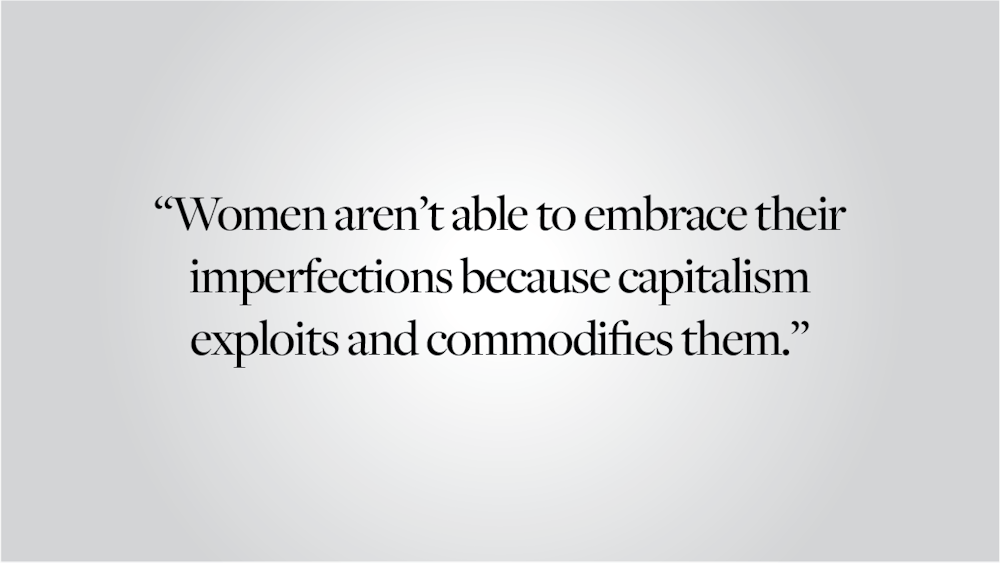If you want to succeed in the beauty industry, you can bank on women’s insecurities.
Today, the still-growing industry is worth $532 billion globally. The United States has the largest beauty market in the world, and the industry’s monetary success is contingent on the unethical exploitation of the vulnerabilities of women.
Many beauty companies, despite marketing almost solely to women, have been created by men. For decades, beauty standards have been curated by the male gaze. The predecessor of the blow dryer was created in 1888 by Alexandre-Ferdinand Godefroy. Mascara was invented by Eugéne Rimmel in the 19th century. The founder of Sephora was Dominique Mandonnaud, while Revlon was founded by Charles Revson. Even now, men are overwhelmingly represented among executives of leading cosmetic brands. The pattern is clear: Men are and always have been the masterminds behind the beauty industry. They craft products that contribute to an idealized perception of women’s beauty and then profit off of women’s attempts to fulfill these unattainable goals.
Insecure women are ideal targets for businesses to capitalize on. Many customers exhibit a kind of consumer behavior that psychologists have termed compensatory consumption. Consumers who manifest this behavior often feel compelled to purchase a product when they are reminded of their weaknesses or deficits. Thus, a threat to such a consumer’s self-esteem, confidence or control often results in the desire to purchase a product that can restore what they believe is lacking. This phenomenon benefits beauty companies, which frequently present their products as solutions to women’s physical imperfections. Anti-aging moisturizers, for example, promise to remove wrinkles from worn-out skin. Blowdryers promise to add volume to shapeless hair. These goods induce self-consciousness and insecurities that prime women to think they need these products and ultimately buy them.
Yet using these products is detrimental to women in multiple ways. First of all, the financial costs of beauty consumption are substantial. A study conducted by Groupon suggested that the average American woman spends about a quarter of a million dollars within the beauty industry in her lifetime. Secondly, these industries help establish unachievable and unrealistic beauty standards that incubate mental health issues such as body dysmorphia and low self-esteem. Finally, the effects of some beauty regimes, like botox, can be addictive, which only increases profits for their proprietors. Women aren’t able to embrace their imperfections because capitalism exploits and commodifies them.
Moreover, women’s insecurities have laid the foundation for some particularly insidious cosmetic marketing strategies. A study conducted by marketing firm PHD surveyed the times and occasions that American women felt the most insecure about their physical appearance. Their results showed that an overwhelming majority of women felt the least attractive on Mondays and in the mornings. Based on these findings, the study suggests that businesses should capitalize on these prime moments of insecurity to sell their beauty products. With the help of technology, it is easier than ever for companies to reach women at these very moments of vulnerability. The discussion this study sparked demonstrates that profit is prioritized above the well-being of women.
Even as beauty industries pivot to increasingly genderless marketing campaigns, they are on the whole only following larger social trends of gender fluidity. Though one could argue these shifts are driven by an authentic empathy for women, they can just as well reflect a desire to make money off a new cohort of customers, regardless of gender. This business was built off the exploitation of women and we should not be naive enough to accept them as inclusive because of a new wave of marketing campaigns.
Men have pioneered a multibillion-dollar beauty industry that reveals the intrinsic relationship between capitalism and the patriarchy. The mission to enhance women’s beauty is at the center of far too many businesses — the refinement of a woman’s physical appearance has been reduced to the fertile ground for often-male entrepreneurs to advance lucrative corporate projects. The beauty industry has been ignorant of its impact on women for far too long — these companies should be aware of their corrosive impact and change their strategies accordingly.
Yael Wellisch ’26 can be reached at yael_wellisch@brown.edu. Please send responses to this opinion to letters@browndailyherald.com and other op-eds to opinions@browndailyherald.com.
Yael was the senior editor of opinions of The Herald's 135th editorial board. She previously served as an opinions editor and a member of the Editorial Page Board. She is from Washington, D.C. and studies history and international and public affairs.





